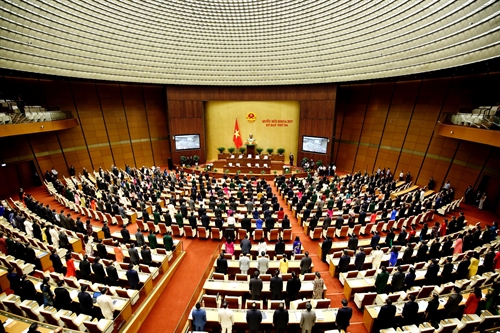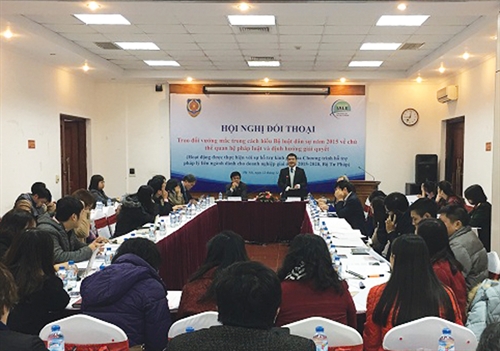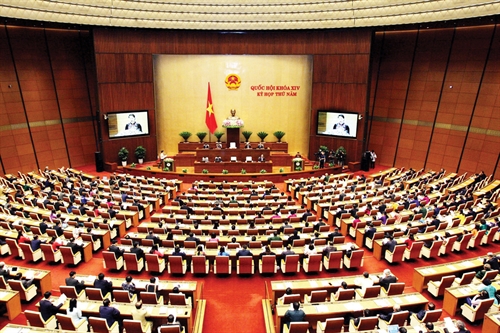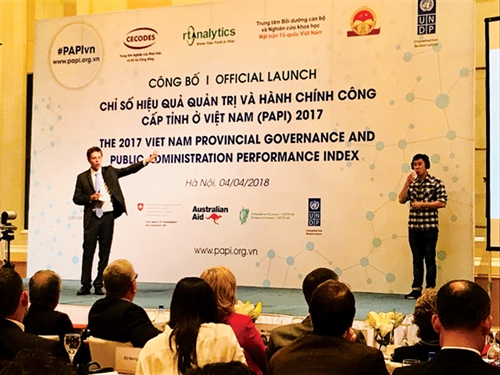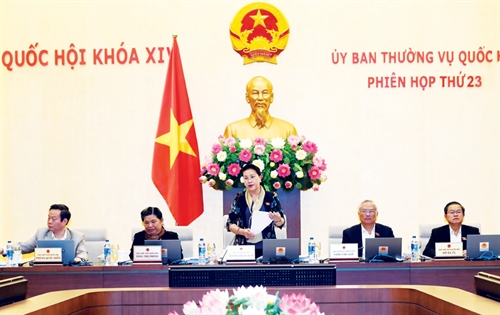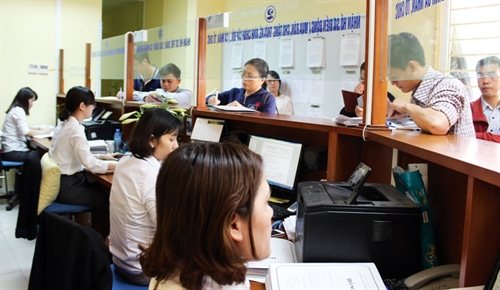On May 23, 2018, on behalf of the Party Central Committee of the 12th Congress, General Secretary Nguyen Phu Trong signed Resolution No. 28-NQ/TW on reforming social insurance policy torward the goal of universal social insurance.
Vietnam Law and Legal Forum would like to introduce main parts of the Resolution.
VIEWPOINTS AND OBJECTIVES
Viewpoints
- Social insurance is a key pillar of the social security system in a socialist-oriented market economy, contributing significantly to realizing social progress and justice, ensuring socio-political stability, people’s life and national sustainable development.
- A system of flexible, diversified, multi-layered, modern and internationally integrated social insurance policies will be developed; social resources will be mobilized according to the national tradition of mutual affection, aiming to expand the coverage of social insurance to the entire population according to a roadmap suitable to the socio-economic development conditions, and harmonizing the principles of contribution-receipt, fairness, equity, sharing and sustainability.
- Reform of social insurance policies is both urgent and long-term, harmoniously combining continuity and stability with renewal and development, and must be placed in the relationship with the renewal and development of other social policies, especially the wage and income regimes and social assistance, in order to guarantee social security for all citizens.
- A streamlined, professional, efficient and modern social insurance policy implementation system will be developed to enhance attractiveness (of social insurance), win the trust and ensure the satisfaction of the people as well as social insurance participants.
- Well implementing the social insurance policies is the duty of the whole political system and the responsibility of Party committees and administrations at all levels, the Vietnam Fatherland Front, socio-political organizations, businesses and every citizen.
Overall objectives
To reform social insurance policies to make social insurance truly be a key pillar of the social security system, step by step steadily expand the coverage of social insurance toward the goal of social insurance for all. To develop a diversified, multi-layered, modern and internationally integrated social insurance system on the principles of contribution-receipt, fairness, equity, sharing and sustainability. To raise the capacity, effectiveness and efficiency of the state management of social insurance and develop a streamlined, professional, modern, reliable and transparent social insurance policy implementation system.
Specific targets
By 2021:
About 35 percent of the working-age workforce will be covered by social insurance, with farmers and informal-sector laborers participating in voluntary social insurance making up about 1 percent of the working-age workforce;
About 28 percent of the working-age workforce will be covered by unemployment insurance; about 45 percent of people passing the retirement age will enjoy monthly pensions or social retirement allowances;
The e-transaction rate will be 100 percent; level-4 online public services will be provided; the number of hours of transactions between the social insurance agency and businesses will be reduced to the ASEAN-4 level;
The rate of satisfaction of social insurance participants will reach 80 percent.
By 2025:
About 45 percent of the working-age workforce will be covered by social insurance, with farmers and informal-sector laborers participating in voluntary social insurance making up about 2.5 percent of the working-age workforce;
About 35 percent of the working-age workforce will be covered by unemployment insurance; about 55 percent of people passing the retirement age will enjoy monthly pensions or social retirement allowances;
The rate of satisfaction of social insurance participants will reach 85 percent.
By 2030:
About 60 percent of the working-age workforce will be covered by social insurance, with farmers and informal-sector laborers participating in voluntary social insurance making up about 5 percent of the working-age workforce;
About 45 percent of the working-age workforce will be covered by unemployment insurance; about 60 percent of people passing the retirement age will enjoy monthly pensions or social retirement allowances;
The rate of satisfaction of social insurance participants will reach 90 percent.
 |
| Workers of VIT Garment, a wholly foreign-invested export garment producer__Photo: Internet |
REFORMS
Reforms will be comprehensively implemented to expand the coverage of social insurance toward the goal of social insurance for all; the balance of the Social Insurance Fund (SIF) will be ensured in the long run; pensions will be adjusted in a relatively independent manner relative to the wage of working persons, and the method of adjusting pensions will be changed toward sharing.
Building a multi-layered social insurance system
Social retirement allowances: The state budget will provide allowances for the elderly without a pension, or monthly social insurance. Policies will be adopted to mobilize additional social resources so that these persons may enjoy higher benefits; the age eligible for social retirement allowances will be step by step reduced in conformity with the budget’s capability.
Basic social insurance includes compulsory social insurance and voluntary social insurance. Compulsory social insurance (with pension, survivorship, occupational accident, occupational disease, sickness, maternity and unemployment benefits) is based on contributions of employees and employers. Voluntary social insurance (with current pension and survivorship benefits and to be gradually expanded to other benefits) is based on contributions of workers without industrial relations; appropriate support from the state budget for farmers, the poor, low-income earners, and informal-sector workers in order to expand the coverage of social insurance. The awareness and responsibility of employees to ensure social security for themselves will be raised. The coverage of social insurance will be expanded according to the roadmap of increasing the retirement age suitable to each period.
Supplementary pension insurance is a voluntary retirement scheme based on market principles, enabling employers and employees to make additional contributions in order to receive higher pensions.
Amending the regulations on the condition on minimum social insurance participation duration in order to enjoy the retirement regime in a flexible manner, concurrently with adjusting the method of pension calculation according to the principles of contribution-receipt, fairness, equity, sharing and sustainability. Expanding subjects participating in compulsory social insurance to other groups
The condition for enjoying the retirement regime will be modified in the direction of gradually reducing the number of years of paying social insurance premiums in order to enjoy the retirement regime from 20 years to 15 years, toward 10 years, with appropriate benefit levels, aiming to enable elderly workers who have low numbers of years of social insurance participation to enjoy social insurance benefits.
The method of calculating pensions will be improved to ensure equality between men and women, between the state and non-state sectors, harmonizing the principles of contribution-receipt and sharing between people with high and low wages to narrow the income gap among pensioners. The subjects participating in compulsory social insurance will be expanded to business household heads, managers of enterprises, unpaid managers and administrators of cooperatives, and employees working on a flexible basis.
Strengthening linkage and support between social insurance policies as well as the flexibility of the policies to achieve the goal of expanding coverage
The unemployment insurance policy will be revised, attaching importance not only to the solutions to handling the consequences through the payment of unemployment benefits, training to meet the requirements of new jobs, and job placement, but also to measures to prevent and reduce unemployment by supporting enterprises to maintain production and business and ensure employment. Flexible and short-term voluntary social insurance packages will be designed to enable employees to have more choices. Voluntary social insurance regimes will be expanded, facilitating the shift between voluntary and compulsory social insurance toward making social insurance compulsory for all workers who have a job and earn income and wage when all necessary conditions emerge.
Reforming the formulation and implementation of policies in order to win the trust and increase the level of satisfaction of social insurance participants
Social insurance policies will be developed to ensure fairness and non-discrimination among the target groups; the sharing between beneficiary groups will be promoted to overcome unreasonable, too large differences in benefit levels. Administrative reform and application of information technology will be stepped up to simplify the processes and procedures for social insurance registration, premium payment and benefit enjoyment, and improve the quality of social insurance services toward friendliness, openness and transparency.
Increasing the number of informal-sector employees participating in social insurance
Promoting the development of enterprises in the spirit of Resolution No. 10-NQ/TW dated June 3, 2017, by the Party Central Committee of the 12th Congress on development of the private economy to become an important driving force of the socialist-oriented market economy. To study and design short-term social insurance packages with levels of premiums and benefits and methods of transaction suitable to informal-sector workers.
Correcting the irrationalities of the current retirement insurance regime in the direction of more flexible conditions for enjoying the pension regime, stricter regulations on enjoying the lump-sum social insurance regime, and increasing the actual average retirement age of employees
Appropriate regulations will be issued to mitigate the situation of receiving one-time social insurance benefits in the direction of increasing the benefits if the social insurance entitlements are reserved for the purpose of enjoying the retirement regime and reducing the benefits if enjoying one-time social insurance benefits.
Regulations will be revised to encourage employees to participate in social insurance for longer time, gradually increase the average retirement age, and increase the reduction rate of pension for employees who wish to retire early.
Raising the retirement age according to roadmap
Adjusting the retirement age should have a long-term vision and a roadmap in line with economic growth, job creation and unemployment, without causing negative impacts on the labor market, ensuring the size, quality and structure of the population, and gender equality; balancing the SIF in the long term; the population aging trend; and the nature and types of labor and sectors.
From 2021, the retirement age will be adjusted according to the goal of raising the retirement age, narrowing the gender gap in the retirement age; for special occupations and professions, employees will be entitled to five years earlier or later than the general retirement age.
Amending regulations on premium rates and grounds for payment of social insurance premiums so as to achieve the objective of expanding the coverage of social insurance
The regulations on the basis for paying social insurance premiums applicable to enterprises will be revised to bring this basis to at least around 70% of the total salary and other incomes of salary nature of employees with a view to overcoming the situation of evasion and underpayment of social insurance premiums, which affects the balancing capability of the SIF and interests of employees.
The percentage of contribution to the SIF will be adjusted in the direction of harmonizing the interests between employers and employees.
 |
| Insurance agents mobilize people of Gia Lai province’s Dak Doa district to participate in health insurance__Photo: VNA |
Adjusting the accumulation rate in order to maximize the rate of pensioners in line with international practices
The way of calculating pensions will be changed toward reducing the accumulation rate, ensuring the balancing capability of the pension funds in the long term and in line with international practices. A roadmap will be needed for extending the social insurance participation duration to protect the interests of pensioners on the principles of contribution-receipt, fairness and appropriate sharing.
Diversifying the investment portfolio and structure of the SIF on the principle of safety, sustainability and efficiency
The evaluation and forecasting of finance and investment efficiency of social insurance funds will be intensified; the investment portfolio and structure of the SIF will be diversified on the principle of safety, sustainability and efficiency, giving priority to investing in government bonds, particularly long-term ones, step by step expanding investment to areas with high profitability and investing according to a roadmap part of idle money of the Fund through trust in the domestic and international markets to ensure safety and sustainability.
Adjusting pensions in a relatively independent manner compared to the wages of working persons, changing the way of adjusting pensions in the direction of sharing
Social retirement allowances will be adjusted according to the state budget’s balancing capability; the basic pension will be adjusted mainly according to the consumer price index increase, the capacity of the SIF and the state budget; proper adjustments will be made with regard to those who have low pensions and retired before 1995 with a view to narrowing the pension gap among people retiring in different periods.
MAJOR TASKS AND SOLUTIONS
Enhancing the leadership and direction of the work of public information and raising awareness about social insurance policies
The contents and forms of public information about social insurance policies and laws will be renovated to make all people understand the necessity, benefits, role, significance and contents of the social insurance policy reform.
Improving the legal framework on labor, employment and social insurance
Social insurance laws and policies will be improved in combination with perfecting the laws and policies on wages and employment and policies toward people with meritorious services to the revolution and related policies and laws.
The law on social insurance will be revised toward realizing social insurance for all, putting into place a multi-layered social insurance system, and improving the regulations on social insurance premium payment and benefit enjoyment on the principles of equity, fairness, sharing and sustainability. It is necessary to revise the regulations on Vietnamese workers going to work overseas and foreigners working in Vietnam to participate in compulsory social insurance along with stepping up the negotiation and signing of bilateral agreements on social insurance.
Unemployment insurance and employment policies will be revised toward assisting enterprises and employees in maintaining jobs, ensuring their legitimate interests, overcoming the problems of fraud and profiteering in unemployment insurance. Specific regulations will be issued to create a mechanism to strictly manage and ensure the safe, sustainable and efficient investment of the SIF.
Stricter sanctions against violations of the social insurance law will be meted out, especially for acts of shirking payment of premiums and profiteering of social insurance benefits in order to ensure that the state management agency in charge of social insurance and the agency managing the SIF will have the competence to sanction enterprises committing the above-said acts while enterprises and employees will be entitled to file complaints or lawsuits against these agencies for their violations in the implementation of social insurance policies.
 |
| Insurance agents disseminate the Social Insurance Law among workers of Ha Nam-based Espoir LLC Vietnam right at their workshops__Photo: Dai Nghia/VNA |
Improving the effectiveness and efficiency of the state management of social insurance
Efforts will be made to raise the capacity, effectiveness and efficiency of the state management of social insurance, particularly in planning development strategies and building and perfecting the social insurance legislation.
Coordination among administrations of all levels, sectors and localities in leading and directing the implementation of social insurance policies will be promoted in order to promptly solve difficulties and problems.
Compliance with the social insurance law will be enhanced through the synchronous implementation of administrative, economic and judicial measures to increase the numbers of social insurance participants as well as beneficiaries, especially pensioners. The inspection, examination and supervision of the observance of the social insurance law will also be increased to promptly detect and strictly handle violations, especially shirking of premium payment, fraud and profiteering of social insurance benefits.
Regulations will be revised to promote decentralization of powers to social insurance agencies; the target of developing social insurance participants will be assigned to the localities; the state management and the organizational management of the implementation of social insurance policies will be clearly distinguished.
The coordination, sharing and connection of information and data among the state management agencies in charge of investment, finance, tax and labor will be promoted in order to raise the efficiency of the management of social insurance beneficiaries and implementation of social insurance policies. A database on social insurance and a set of criteria for evaluating performance results and quality of services provided by social insurance agencies will be built.
Enhancing the capacity of management and effectiveness of implementation of social insurance and unemployment insurance policies
The organizational apparatus for implementation of social insurance and unemployment insurance policies will be perfected in accordance with Resolution No. 18-NQ/TW dated October 25, 2017, of the 6th plenum of the Central Party Committee of the 12th Congress on the renovation and reorganization of the political system. The operational capacity of the Social Insurance Management Council will be enhanced.
It is necessary to promote reform of administrative procedures and provision of online public services at level 4 in all fields of social insurance and unemployment insurance. The national insurance database and related databases will be connected to better serve policy implementation and research and policymaking.
The management of social insurance will be further modernized, making investment in technology development and advanced management methods in organizing the implementation of social insurance and unemployment insurance policies. Unemployment insurance policies will be effectively implemented, bringing into full play the functions of unemployment insurance to actually serve as a tool for labor market management. Expenses for organizing the implementation of the unemployment insurance policy will be covered by the unemploy-ment insurance fund, not by the state budget.
Mechanisms for recruitment, training and retraining of human resources (of the social insurance sector) to meet work requirements are needed, especially in the context of a changing labor market and the 4th Industrial Revolution which has been transforming the structure of the labor market.- (VLLF)
